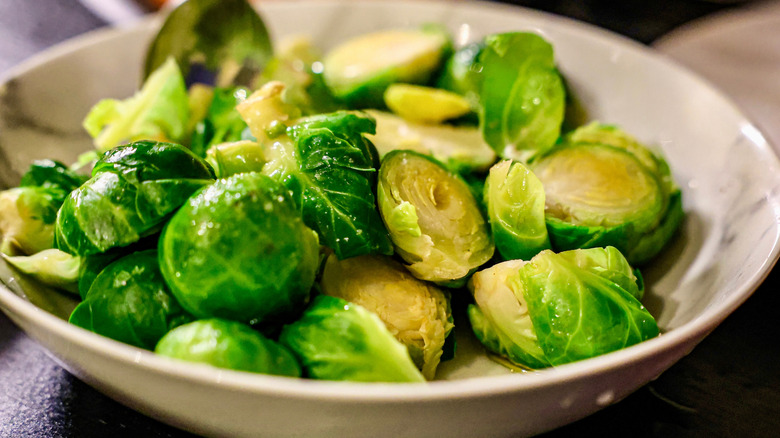Gordon Ramsay Once Called This The Absolute Worst Food To Overcook
Celebrity chef Gordon Ramsay is about as polarizing as they come, with a personality that feels larger than life. He's not bashful, and he will tell you what he thinks lickety split with no remorse, from what he'd eat for his last meal to how much your restaurant sucks. Over his illustrious career, Ramsay has weighed in on just about every food debate imaginable, but one of his most interesting takes came when the topic of overcooking came up during a Reddit AMA. "The only thing I draw the line at, Victoria, is eating overcooked food. There is NOTHING worse than an overcooked Brussels sprout. The smell is disgusting," read his response to a fan who asked if there's anything he will not even taste.
That's classic Ramsay — direct, blunt, and not wrong. Brussels sprouts are one of those vegetables that split the crowd, in that when they're cooked properly, they're nutty, slightly sweet, and kind of addictive. But once they're left too long on the heat, instead of tasting balanced and earthy, the flavor becomes bitter and unpleasant. Their texture suffers too, as the crisp bite is replaced with mush. It's easy to see why Ramsay feels so strongly about them. That putrid smell he's speaking of comes from compounds called glucosinolates, which release sulfur as the sprouts break down.
Yes, in small amounts, the compounds add depth to the overall flavor profile. However, large quantities are a different story altogether because they dominate the dish and leave a taste that sticks in your memory for all the wrong reasons. Ramsay's line captures why so many people grew up hating Brussels sprouts; it probably wasn't the vegetable itself, but the way they were cooked.
Tips for cooking Brussels sprouts that taste great
You don't have to avoid Brussels sprouts altogether for fear of overcooking them and stinking up the place. You just have to be precise with when and how you cook them, and ensure that you're not even coming close to ruining the taste and texture. Instead, you want to bring out their natural sweetness. The simplest way to do this is by roasting them (you could also throw them in the air fryer) because high heat helps caramelize the sprouts, turning their edges golden and crispy while locking in a nutty flavor. About 20-25 minutes in the oven, and you should be good to go. Cutting them in half before roasting exposes more surface area, giving you even more of that caramelized crunch.
If you're working on the stovetop, sautéing or pan-searing works the same way; a quick sear of three to five minutes cut-side down and then flipping them and cooking for another two to four minutes in oil or butter brings out their sweetness without giving them time to turn limp. Steaming or blanching can also be effective, but you have to keep the cook time super short. About five to six minutes is enough to soften them slightly without crossing into mushy territory. Once they're tender and bright green, you can toss them with olive oil, lemon juice, or even a bit of grated Parmesan for added kick. These accents counter any lingering bitterness and highlight the vegetable's natural balance of sweet and earthy flavors.
Brussels sprouts also play well with bold partners like bacon, balsamic vinegar, or maple syrup — ingredients that add contrast while keeping the dish lively. Instead of masking their flavor, these pairings enhance it, creating sprouts that are savory, slightly sweet, and overall delicious.


